Mallika Naguran visits Gangga Island Resort & Spa in Northern Sulawesi, Indonesia to find that managers Hanne Garbol and Gaspare Davi are busy running a viable hospitality and marine tourism business with the interests of island dwellers – both children and adults – firmly in mind.
Gangga Island, 5 December 2009. When Gangga Island Resort & Spa began in 1999, the view was stunning on the outside with clear blue waters and sundrenched islands on the horizon. But what lay beneath was disaster.
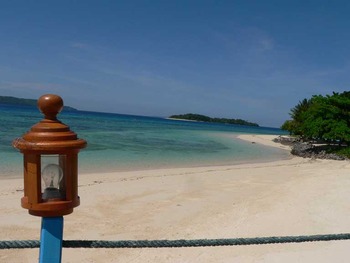
Gangga Resort "below the winds" in Northern Sulawesi.
“The whole place was bombed out,” said Hanne Darbol, general manager of the dive resort. “You would sit here at the restaurant for lunch and you could hear the bomb going out – there was a lot of damage, from the top of the wall down to 20m. Destroyed corals and fishes,” she said.
Having alerted the authorities, marine police on speedboats dampened the destructive bombing and cyanide activities. It used to be confrontational and “pretty rough” up to 2005, even had nets thrown on the divers underwater. “Bombing was the daily activity. I am not saying that it has stopped. When they see Gangga boats now, they start packing up,” she said.
Hanne and her team remain vigilant, reporting on illegal fishing and destructive methods. A few years ago, they helped apprehend the illegal poaching of Napolean wrasses with the media and guests onboard as witnesses.
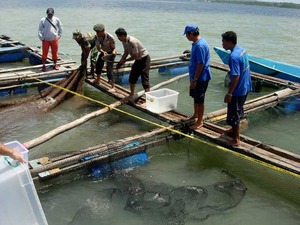
Raid on Napolean wrasse farm.
About 2,000 Napoleans were confiscated from the raid. They were meant to be kept away until they’ve grown to 3 kg and then exported live to restaurants in Singapore, Taipei and Hong Kong. “The result was we made too much publicity out of it. The activity stopped for a while but resumed because the money was too good. It was $3,800 per fish at that time.”
Napolean wrasses released at the Gangga Island reef were left alone but in other places, they were smuggled out once again. According to Hanne, the policemen who helped with the raid were sent to “Siberia” while the television crew never got to air their footage.
“But there have been a lot of positive things too. For instance, we had the World Ocean Conference 2009 in Manado which increased marine protection awareness and now there is less poaching,” smiled the feisty lady in her 50s.
Sea Conservation & Coral Restoration
The bombing of coral reefs results in destruction of marine habitats, so that most reef dwelling sea creatures have nowhere to hide, burrow, feed, live, interact, mate, lay their eggs and congregate. This affects fish’s ability to naturally procreate, translating to a drop in fish population. The balance of ecosystem, needless to say, is whacked.
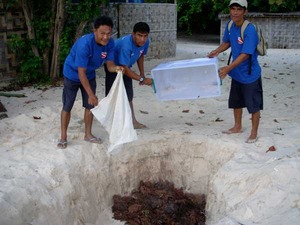
Getting rid of thousands of parasitic Crown of Thorns.
Fishermen who depend on seafood to earn a living and feed their families soon realize their folly. Gangga Island Resort & Spa spent time creating awareness and educating the dwellers on Gangga and other islands on the importance of protecting marine habitats through various programs. There are now two sea gardeners in the village that help with conservation activities including ocean clean-ups and Crown of Thorn starfish removals.
Hanne and Gaspare readily lend villagers a hand with the financing of rope and buoys to help with seafront demarcation. Indonesia has by law dictated the protection of sea in front of village communities as far out as 200m, where no fishing activity can be had. “They know that by closing up the reefs, that’s where the big fish go to lay the eggs. They know it,” she said, adding that unfortunately Gangga Satu kampong (village) on the island lacks this knowledge and continues to cut the lines.
“But we repair. We go on repairing. We are stubborn. The system we have here is a normal Indonesian system, which every village should have. And that is what we are helping with,” said Hanne, explaining that although funding should come from the Government for all villagers, it doesn’t always come through. And when villagers do turn up at their doorstep for financial help, they are not turned away.
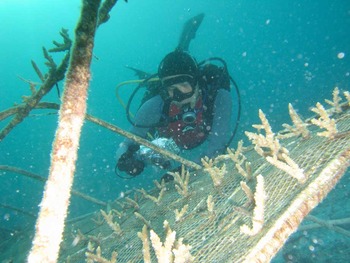
Early days of coral transplanting.
Another on-going revitalization program is the reconstruction of coral reefs using the patented Biorock process. This involves welding a custom-built steel structure that is then powered by a low voltage of electricity to create a chemical reaction. This catalyses the growth of attached coral fragments and makes them hardier to usual environmental stresses.
With around 10 artificial reefs in front of the resort of different shapes and sizes since 2005, the fishes have come back. “Protection of the reef is the first thing, and Biorock is the second, which is a superb system,” she enthused, having previously experimented with other coral restoration methods that failed.
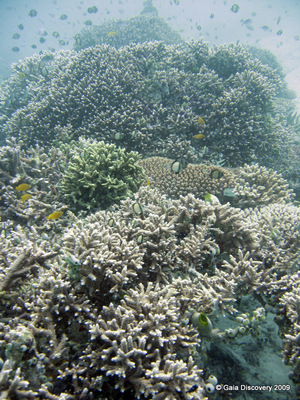
Biorock - alternative coral reef.
Apart from restoring bombed out reefs on their resort front, Hanne and Gaspare had the intention of “exporting” the artificial reefs to other villagers so that they too could benefit from the renewed concentration of marine creatures. But she found the cost of acquisition and maintenance of the structures to be a challenge for the villagers who lack funds and a constant stream of electricity.
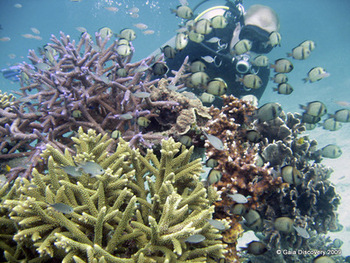
Biorock structure after four years.
Hanne is now considering testing with a cheaper method using concrete-based structures that involve little maintenance to help villagers grow their own corals. “Even if coral doesn’t grow as easy on the concrete, you will have fish, you will have egg, you will have life coming,” she said, hoping that with more fish, the villagers will once again have a thriving fishing trade.
Farming for Livelihoods
Hanne’s eyes sparkled as she spoke about their latest programme. The resort is now looking at experimenting with farming of top marketable sea animals – all in a controlled, responsible manner, without harm to the wildlife of the sea – to create a new form of livelihood for the villagers.
With the help of a German university, Gangga Island Resort & Spa hopes to cultivate sea horses, sea cucumber and abalone because “there’s a huge market for that”. They have built the nursery tanks within the resort five hectare property.
Handy Hanne.
She explains the rationale behind this unusual step for a resort to take. “We try to make 100% circle in making the full process here, from babies to the selling point.” With the help of the institute, training and marketing will be given to the villagers to help them grow and sell these creatures. This is to ensure that there is sustainability of the new farm technique once they have replicated the full process at their villages. It also takes the heat off fishing for such animals from the oceans.
Community Development, Education
For some years now, Gangga Island Resort & Spa has actively sought to improve the health, education and skills development of the surrounding villages. There are two villages on Gangga Island. Gangga Satu kampong comprises mainly Christians, while Gangga Dua is home to Muslims. The total population of both villages is 3,000.
Around 60% of the resort’s staff reside in either of the kampongs, while skilled labour is hired from there such as boat builders and furniture craftsmen. Beautiful homemade woodcarvings are a norm at this resort, like the solar powered hot showers at each guestroom.

Even clean drinking water is hard to come by.
Seven schools exist on Gangga island in total, up to Junior High. In Gangga Satu alone, there are two Government and two private schools. But this is Indonesia – where bureaucracy prevents adequate funding and support.
“We help with renovations of one private school, pay for the children’s milk, sponsor gadgets. Depending on the financial situation of the family, we pay either half or in full of the child’s fee,” said Hanne.
The resort collects a voluntary offering from guests to help with this cause. A donation to the grey envelope with a picture of children on the front of it means that your money helps in any or all of these: sponsoring educational buildings, materials, books; awarding scholarships to technical school; assisting poor families and single parents to pay school fees.
Sand play outside her school.
“The children on the envelope are all grown up now, some are even married,” laughed Hanne, pleased that she and her husband Gaspare, and their dedicated staff at Gangga, could be of some help to the village people.
Photography by Anders Nilsson and Mallika Naguran. Photos of early coral structures and conservation activities courtesy of Gangga Island Resort & Spa.
About Gangga Island Resort & Spa
http://www.ganggaisland.com
More about their conservation programs including Turtle Unlimited
More about Biorock: Global Coral Reef Alliance www.globalcoral.org
See related Gaia Discovery articles on rescuing stressed corals and Gili Trawangan coral reef restoration project.
Read about Thomas J Goreau background and motivations.
Watch Biorock videos.

